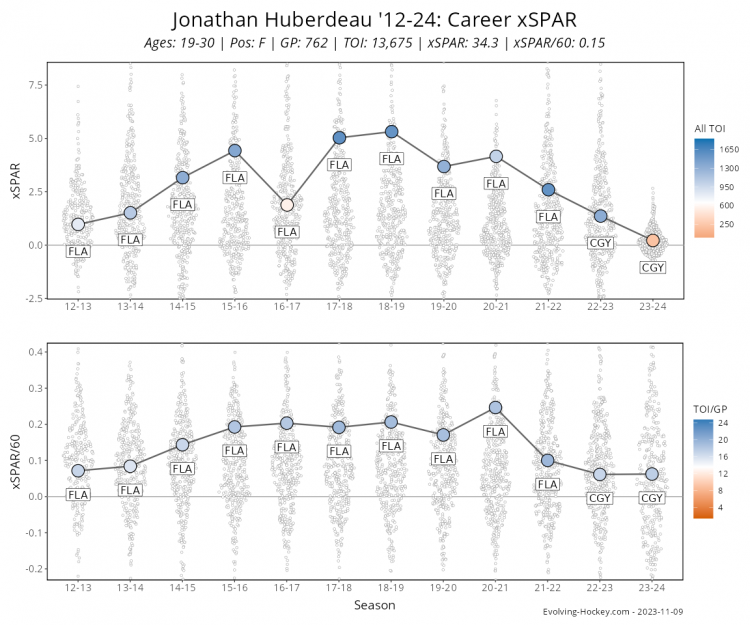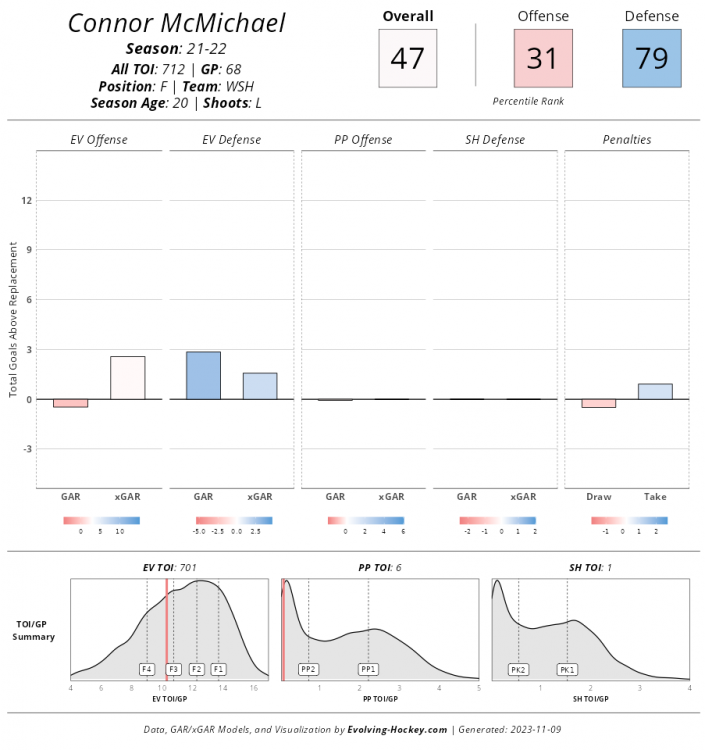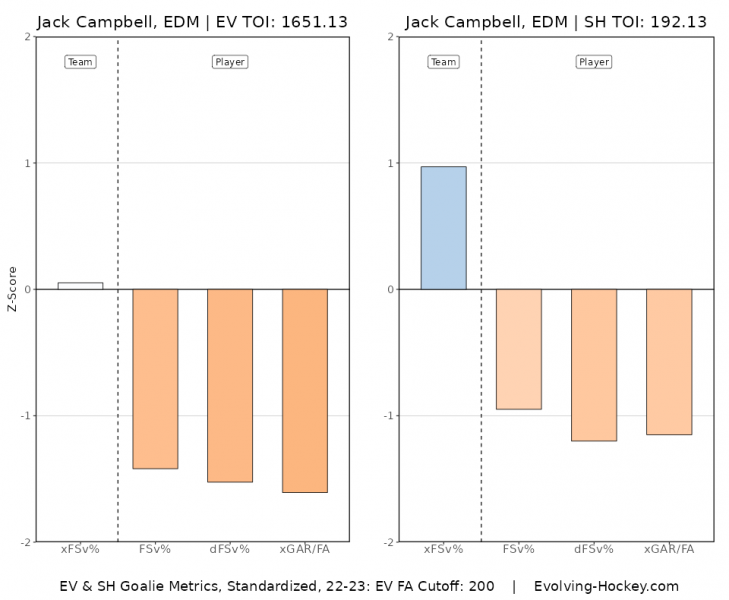Jonathan Huberdeau spent the first 10 seasons of his career in South Florida. At times, he was considered an “underrated” player, quietly producing in a market that got very little coverage outside of the Computer Boys fiasco. The 2021-22 season was the outlier though. Finishing with 115 points in 80 games in the Florida Panthers President’s Trophy campaign, he was in the spotlight. There was a massive campaign for his bid at the Hart Trophy, led by his agent Allan Walsh. However, the analytics community was hesitant to put Huberdeau in the group of the best five players in the league that season. Perhaps the most important members dissecting that were Dom Luszczyszyn and Shayna Goldman.
It’s much trickier to see where Huberdeau’s game is lacking in real-time because it often happens away from the puck — and that’s where data helps us bridge the gap and identify red flags.
What it will tell us is that when Huberdeau is on the ice the Panthers struggle defensively and that they improve dramatically when he’s on the bench. His relative expected goals against rate is 63rd worst among league forwards.
Huberdeau would finish the season with an xSPAR of 2.6, which, although still very good, was his worst mark over the course of a full season since his sophomore season in 2013-14. Huberdeau’s poor defensive pay had always been a small tax to pay for such a gifted offensive player, but it seemed like it was taking a turn for the worse at 28 years old.

With Matthew Tkachuk and John Gaudreau electing to move on from the Flames in the summer of 2022, and with the Flames unwilling to turn to a rebuild, GM Brad Treliving signed Tkachuk to an eight-year contract worth $9.5 million annually before trading him to the Panthers in exchange for Jonathan Huberdeau, MacKenzie Weegar, prospect Cole Schwindt, and a conditional first round pick. Treliving would then commit an eight-year contract to Huberdeau worth $10.5 million annually starting when Huberdeau was 30 years old in July of 2023. Of course, Treliving wouldn’t see a day of that contract as on July 1, he signed Ryan Reaves, John Klingberg, Max Domi, and Tyler Bertuzzi to the Toronto Maple Leafs. Those players combine to cost $14 million against the cap with a combined 1.6 standings points below replacement this season, but that is a story for a different day.
In his first year in Calgary, Huberdeau would struggle. Under head coach Darryl Sutter, his defensive play seemed to make an improvement but with the sacrifice of his offensive play. Over the offseason, the Flames would crown Ryan Huska as their head coach. The vibes improved and long-time Flame Mikael Backlund would extend with and become captain of the Calgary Flames. The opportunity to turn the page was there, but so far, the Flames are 4-7-1. And on Thursday night, Huberdeau would be benched for the entirety of the third period in a 4-2 win against the Predators.
In some senses, analytics have a reputation of being cold. As Greg Wyshynski disclosed on Tuesday, “The NHL made an intentional decision not to showcase negative analytics on the EDGE site.” There seems to be a real fear with the players of being judged by the numbers. For those in the analytics sphere, this feels like an “I told you so” moment, but no one is bouncing around in joy watching Jonathan Huberdeau in misery on the bench while his teammates close out their fourth win of the season.
Heading into this year, Huberdeau’s play had been worth $74 million over the course of his career while he had been paid less the $45 million. No one can blame a player who signed a lucrative contract that carries a cap hit that they cannot play to, especially when they have offered extensive value over the course of their career. The only person to blame is the general manager who signed the contract. Fortunately for Flames fans, that general manager is no longer with the organization, but they still have to live on with his mistake for years to come.
The Oilers continue to struggle
After a strong Heritage Classic game against the Flames, the Oilers have continued to skid. As things stand, they are 2-8-1 which ranks them 31st in the league ahead of only the San Jose Sharks. On Tuesday, the Oilers made the move to waive Jack Campbell for purpose of assignment, sending the 31-year-old down to the American Hockey League.
Campbell was acquired by the Oilers via free agency in the summer of 2022, signing a five-year contract worth $5 million annually. In his first season with the Oilers, he allowed 18.9 more goals than expected, and had allowed 3.2 more goals than expected in his five games this season.
Perhaps this move can be a catalyst to wake the team up. While there continues to be much talk about the systems, there isn’t much discussion about the players executing the system, nor their strong underlying numbers. There was a good thread on Twitter going over an example of the Oilers failing to execute in the 1-1-3 neutral zone forecheck. The Oilers need to weather the storm right now, and it will be up to their leadership core to guide their team to sunny days again.
The Hurricanes fourth line
The Toronto Maple Leafs fourth line has been in the news for all of the wrong reasons. Meanwhile, down south, the Carolina Hurricanes fourth line has been cruising. This early in the season, there are only 14 lines that have played 100 minutes together, and the Carolina fourth line or Jesper Fast, Jordan Martinook, and Jordan Staal lead them all with a 73.8% share of expected goals and a 71.2% share of shot attempts. Plus, this line has not been out for a single goal against, which is their main objective after all.
The Hurricanes haven’t gotten off to the start the models may have expected, with an 8-5-0 record, but they are still one of the best defensive teams in the league who controls play extremely well.
The Philadelphia Flyers penalty kill
This season has been a mixed bag for the Flyers. Their 5-7-1 record, including the only loss to the Sharks so far, still isn’t good. They expected the poor record though. A mid body injury (whatever that means) to Carter Hart and consistently scratching Morgan Frost probably wasn’t in the cards though.
On shining spot for the Flyers has been their penalty kill. Through 13 games, they allow the fewest expected goals and shot attempts per 60 minutes at 4v5. Furthermore, they are creating their fair share of offense, something that is probably helping the defensive metrics. They have created the second most expect goals per 60 minutes and most shot attempts at the same strength. That all leads to a pretty ridiculous -2.13 expected goal differential per 60, where the next best team is -5.05. And lucky enough for the Flyers, this has aligned with their actual goal differential per 60 of -2.51. Whoever is running that penalty kill didn’t get the memo that the Flyers are still tanking.
Connor McMichael coming to form
On Wednesday night, Connor McMichael scored a shorthanded goal against the Florida Panthers, his third goal of the season. McMichael was selected 25th overall in the 2019 NHL Draft out of London of the OHL, courtesy of the Hamilton Bulldogs who traded him to London in exchange for Robert Thomas in their 2018 Memorial Cup run. However, it has been a rocky start to the Canadian’s career thus far. By the numbers, his rookie season was quite effective, but he wasn’t used much averaging just over 10 minutes.

Last season, which was his sophomore campaign, McMichael only played in six NHL contests, spending the vast majority of the year with the Calder Cup Champions in Hershey. But under new coach, Spencer Carbery, and fully committed to the rebuild, McMichael is finally seeing some playing time. As the third line center, McMichael has three goals and a pair of assists in 11 games. He’s also second on the team in xGF% at 57.1% and is fifth in CF% at 51.4%. McMichael isn’t the first line center of the future, but his success in a middle-six center role could be vital to the rebuilding efforts of the Capitals.
